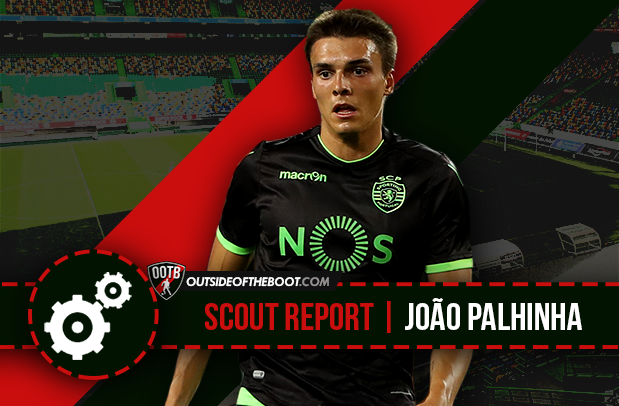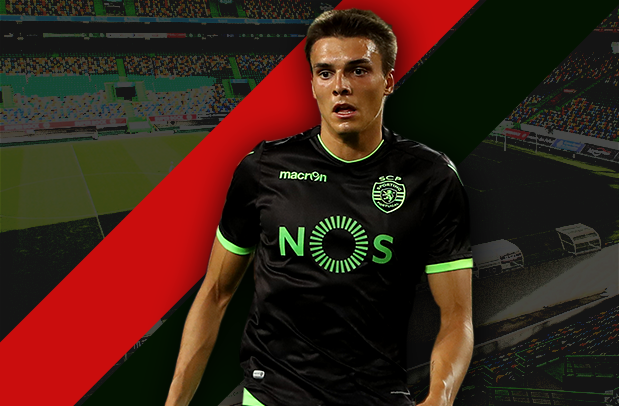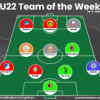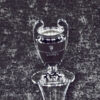Jose Miguel Saraiva writes a detailed scout report about João Palhinha, the Sporting CP and Portugal midfielder.
Sporting Lisbon is getting more and more famous when it comes to raising young players and turning them into world-class stars. With the recent Sporting Lisbon pupil Ruben Semedo’s 15 million transfer to Villarreal, here comes another one of Sporting’s prodigies, who hasn’t drawn much international attention yet but will certainly catch the eye of some of the best clubs in Europe soon.

Who is João Palhinha?
João Palhinha is a 21-year-old Sporting Lisbon’s defensive midfielder. He arrived in Sporting when he was 17 years old from the third-tier Portuguese club Sacavenense. As soon as he arrived, and after playing his first games, he almost immediately guaranteed a starting place in Sporting Lisbon’s U18 team and started drawing attention from the senior team coaches.
He was transferred to Sporting Lisbon in the 2012/13 season and in only half a season he played 16 games, scoring 2 goals, which is not a bad ratio given the position he plays in.
In the season of 2015/16, he played on loan for the first-tier Portuguese club Moreirense F.C., having played a total of 29 games in the Portuguese Primeira Liga, where he performed greatly and caught the eye of Sporting Lisbon’s coach Jorge Jesus.
In the 2016/17 season he started the pre-season in the main squad, but went to play on loan in the first-tier Portuguese team Belenenses. In the middle of the season, in December, Jorge Jesus decided to call him back, given his outstanding performances for Belenenses and the crisis facing Sporting Lisbon’s squad, where some players were sent away for not reaching the level of performance that was demanded from them. Until the end of the 2016/17 season, Palhinha played 11 games for the Sporting Lisbon’s main team, presenting himself as a valid to solution to the famous European champion William Carvalho, who until Palhinha’s arrival held the status of an irreplaceable player.
As regards international experience, he made his international debut for the U19 Portuguese team, having played 7 games, 2 of which were in the 2014 U19 European Championship. He went on playing for the U20 Portuguese team and is currently at the service of the U21 team, who will participate in the 2017 U21 European Championship.
What is his style of play?
If a common spectator watches a Sporting Lisbon’s game, he will understand that Palhinha, compared to, for example, William Carvalho, is a defensive midfielder with a very particular set of skills. He is not as cunning as his teammate, doesn’t always try to make long passes, and imposes a stronger physical as well as psychological presence and behaviour on the field.
He is not the common distributor, who constructs his team’s game from the back onwards, with flawless long passes, instead playing the part of the wall that keeps the opposite team from getting close to his goal. He uses, in a rather intelligent way, his enormous physical power to retrieve the ball without faulty actions and instead of leading the way in his team’s strategy, he prefers to leave the construction of the back-to-forth transitions to his midfield colleagues.
He is certainly a difficult player to pass through and gives especially great security to his colleagues at the back, and to the rest of the team as well.
What are his strengths?
João Palhinha makes it hard to describe is main qualities, given that he is such a complete player. Nevertheless, there is an attribute that catches the eye of any spectator: his physical and psychological strength. João Palhinha is undoubtedly an incredibly strong player. He is 6 foot 3 inches tall and is physically very powerful. Now, this kind of strength would be rather irrelevant in a football match if he didn’t possess motivation as well as great intensity, which he evidently has. When you see Palhinha playing, you almost feel like there is a rather fast tractor on the field, trying to reach everywhere and also looking to stop his opposite attackers, never allowing them to reach a position that is dangerous and threatening for his team.
His height also makes him a very valuable player on free-kicks and corners, and given that he is rather capable of using his height to both score goals and to prevent the other team from scoring them against him, it most certainly is an asset.
Although it can sometimes go unnoticed, his short passing skills are very developed and that distinguishes him from the common strong and physical player, whose only ability is his physical strength and nothing else. João Palhinha is not a technical prodigy, like William Carvalho is, for example, but he is very competent in this matter.
What are his weaknesses?
As stated before, João Palhinha is a very complete player, and he doesn’t have a rather evident weakness or flaw. One thing that he could improve, though, is his confidence. It was notorious in some matches he played for Sporting Lisbon that he was nervous and anxious, which can also be explained by his young age. It was very evident when he played against Oporto, where the result was 2-1 for the Oporto team, that he was not very confident and committed some mistakes that even led Sporting’s coach Jorge Jesus to admit, after the match, that Palhinha was a bit off his game. Even so, confidence comes with experience and Palhinha will certainly become a more confident player in the future, provided he is given the opportunities to play regularly.
He could also improve his long passing skills. He doesn’t often resort to long passes, given he is not as gifted as some of his most prominent colleagues but even in this matter he is a competent player, even though he isn’t particularly gifted.
The future is colourful for João Palhinha if he keeps on improving and evolving like he evidently has in the last 5 years, and Sporting Lisbon is definitely a good team for him to grow up in.
Read all our scout reports here
- Scout Report: Gonçalo Paciência | Eintracht’s exquisite forward - August 17, 2018
- Scout Report: Diogo Gonçalves | Benfica’s tricky winger - August 15, 2018
- Scout Report: Diogo Dalot | Manchester United’s New Full-Back - August 6, 2018
























































